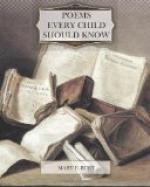What plant we in this apple-tree?
Fruits that shall swell in
sunny June,
And redden in the August noon,
And drop, when gentle airs
come by,
That fan the blue September
sky,
While children
come, with cries of glee,
And seek them where the fragrant
grass
Betrays their bed to those
who pass,
At the foot of
the apple-tree.
And when, above
this apple-tree,
The winter stars are quivering
bright,
The winds go howling through
the night,
Girls, whose eyes o’erflow
with mirth,
Shall peel its fruit by cottage
hearth,
And guests in
prouder homes shall see,
Heaped with the grape of Cintra’s
vine,
And golden orange of the line,
The fruit of the
apple-tree.
The fruitage of
this apple-tree,
Winds and our flag of stripe
and star
Shall bear to coasts that
lie afar,
Where men shall wonder at
the view,
And ask in what fair groves
they grew;
And sojourners
beyond the sea
Shall think of childhood’s
careless day,
And long, long hours of summer
play,
In the shade of
the apple-tree.
Each year shall
give this apple-tree
A broader flush of roseate
bloom,
A deeper maze of verdurous
gloom,
And loosen, when the frost-clouds
lower,
The crisp brown leaves in
thicker shower.
The years shall
come and pass, but we
Shall hear no longer, where
we lie,
The summer’s songs,
the autumn’s sigh,
In the boughs
of the apple-tree.
And time shall
waste this apple-tree.
Oh, when its aged branches
throw
Thin shadows on the ground
below,
Shall fraud and force and
iron will
Oppress the weak and helpless
still!
What shall the
tasks of mercy be,
Amid the toils, the strifes,
the tears
Of those who live when length
of years
Is wasting this
apple-tree?
“Who planted this
old apple-tree?”
The children of that distant
day
Thus to some aged man shall
say;
And, gazing on its mossy stem,
The gray-haired man shall
answer them:
“A poet of the
land was he,
Born in the rude but good
old times;
’Tis said he made some quaint
old rhymes
On planting the
apple-tree.”
WILLIAM CULLEN BRYANT.
[Illustration]
PART V.
On and On
JUNE.
“June” (by James Russell Lowell, 1819-91),
is a fragment from “The
Vision of Sir Launfal.” It finds
a place in this volume because it is the most perfect
description of a charming day ever written.




